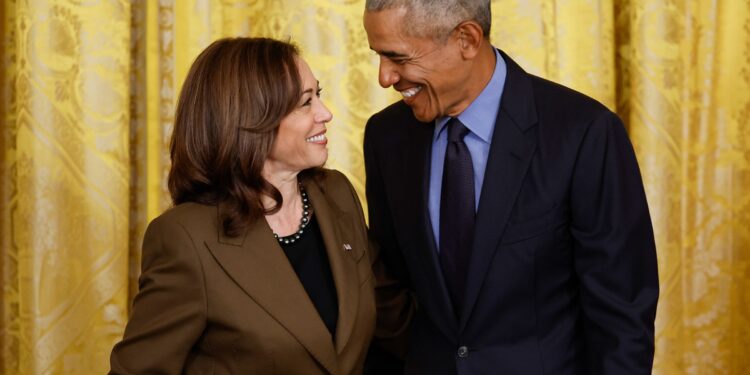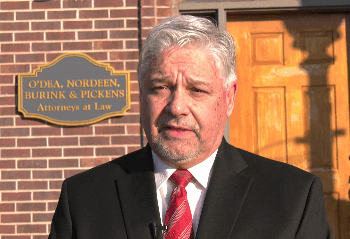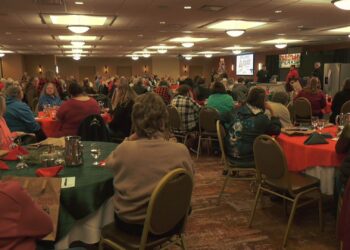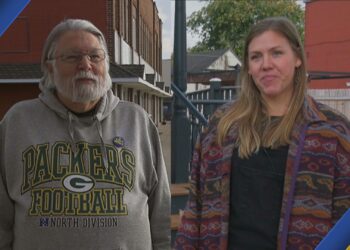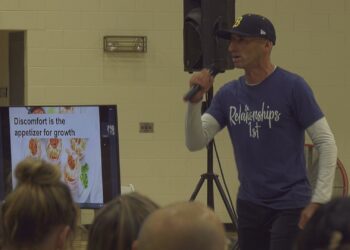Originally Published: 20 AUG 24 04:00 ET
By Jeff Zeleny and Kevin Liptak, CNN
Chicago (CNN) — If there was one lesson Kamala Harris took from the 2004 Democratic National Convention, it was to fuel up for some long days.
“You definitely have to eat your Wheaties,” the then-39-year-old San Francisco district attorney told a crowd in Boston before heading off to what had become the week’s hottest ticket: a party celebrating the breakout keynote speaker, US Senate candidate Barack Obama of Illinois.
Now, 20 years later, Obama – who went from star of that convention to the nation’s first Black president in a short four years – will speak on behalf of Harris, the party’s newly minted standard-bearer, delivering a “forceful affirmation that Harris is the right leader for the moment,” an adviser said.
Arriving at this moment was indirect, painstaking and awkward for so many Democrats, considering the 2024 convention was long intended to be a celebration of President Joe Biden, Obama’s onetime vice president. Obama is among the party elders whose quiet maneuvering helped Biden realize that Democrats were headed to almost certain defeat if he stayed on the ticket.
Harris’s quick ascension to the top of the Democratic Party would have been unlikely without the swift endorsement of Biden – whose own presidency was made possible in no small part by Obama.
“She served him, and now he’s serving her and supporting her to be the president,” said Illinois Rep. Jonathan Jackson, who represents much of Chicago’s South Side. “He’s an honorable man, and history will be his best friend.”
Yet in many ways, Harris’ rise to presidential nominee amounts to a continuation of the arc that began with Obama on that summer evening in Boston two decades ago.
She is the first woman of color to become the nominee of a major American political party. And in only four weeks of rallying Democrats behind her, the energy fueling her candidacy and thunderous crowds chanting her name have drawn comparisons to Obama’s history-making 2008 run.
“This is a candidate who’s energized the party in a way that I haven’t seen, certainly since ’08,” Illinois Gov. JB Pritzker told CNN. “I’ve not felt this kind of energy and electricity at any convention other than the one for Barack Obama.”
Decades in the making
For two barrier-breaking politicians – Obama, 63 and Harris, 59 – this year’s convention is a bookend 20 years in the making. As both climbed the Democratic ranks, they have intersected at various moments, each coming to represent, and embrace, an image of the party’s next generation, following in the footsteps of civil rights giants who came before them.
It was 2009 when journalist Gwen Ifill drew this connection between the two, saying on the “Late Show with David Letterman”: “They call her the female Barack Obama.”
They have never formally worked together, either in the Senate or in Obama’s administration, although Harris has written that Eric Holder, Obama’s first attorney general, asked if she’d be interested in replacing him when he stepped down.
Obama played a key role in her election as California attorney general in 2010, endorsing her candidacy and arriving in Los Angeles for an October rally that helped boost her campaign. To a crowd of thousands, he described Harris as “a dear, dear friend of mine, so I want everybody to do right by her.”
Two years later, Harris delivered a brief speech at the Democratic convention in Charlotte, as Obama was fighting for reelection against Mitt Romney.
“We need to give him another four years. We need to move forward,” Harris told the crowd on the second night of the convention. “President Obama will fight for working families. He will fight to level the economic playing field and fight to give every American the same fair shot my family had.”
Near the end of his second term, Obama took the rare step of weighing in on California’s all-Democratic Senate race. He not only endorsed Harris, but filmed television ads with the message: “Kamala Harris will be a fearless fighter for the people of California every single day.”
Along the way, there have been moments of awkwardness. At a fundraiser in 2013, Obama deemed Harris the “best looking attorney general” in the country – an aside for which he would later call to apologize.
Door-knocking for Obama
While Harris recalls seeing Obama at the Boston convention, aides to the former president say his first memory of meeting Harris came a few months later during a California fundraising event for his 2004 Senate race.
Four years later, as Obama was mounting a long-shot bid for the White House, Harris bucked many in her party to endorse him over then-Sen. Hillary Clinton, who had the early support of much of the Democratic establishment and many Black leaders.
Harris flew to Springfield, Illinois, to watch him announce his candidacy; a photo from that February day in 2007 shows a windswept Harris – then the district attorney in San Francisco – not onstage or in a VIP room, but among the crowd, waiting for Obama to walk past and shake her hand.
In the lead-up to the Iowa caucuses, she packed her black down jacket and boots and trekked to Des Moines right after Christmas to join the ranks of Obama’s army of volunteers.
“No job was too small for any of us,” Harris would later recall, “and we spent hours in freezing temperatures knocking on doors.”
Behind one of those doors at a senior-living facility was a well-dressed Black woman who – when Harris asked whether she planned to caucus for Obama – told her flatly: “They not gonna let him win.”
It was a moment Harris would later recall that changed her perspective.
“Her response suggested to me that, because she had seen and experienced significant disappointments in her life, she didn’t want to have hope about electing the first black President, only to suffer disappointment when he didn’t win,” she wrote years later.
On the evening of the caucuses, Harris was tasked with handing out pizza in the cold – and ran into the same woman, waiting in line wearing a fox stole.
Obama won Iowa, but the battle against Clinton was far from over. A few months later, Harris was dispatched to San Jose to pitch Obama to California activists and superdelegates at the party’s state convention in March.
She was virtually unknown on the national stage. The Clinton campaign’s surrogate at that gathering – the candidate’s husband, former President Bill Clinton – was decidedly not.
“Can you say ‘gulp’?” Harris joked before the crowd.
In her address, however, Harris tied her appearance on the same stage as a former president as in keeping with Obama’s candidacy.
“When you really think about it, hasn’t that been, from the beginning, what this campaign to elect Barack Obama has been about?” she asked. “Hasn’t it been about the audacity to do things unimaginable?”
Modeling after Obama – and Biden
When Harris launched her Democratic presidential campaign in 2019, she sought Obama’s counsel on her message and strategy. She had two meetings with him in Washington, aides said, and occasionally talked by phone. Obama offered similar advice to all candidates, including Biden, but offered no endorsement in the primary.
As she campaigned across Iowa in a crowded field of candidates, Harris often invoked Obama’s grassroots support that propelled him to victory over Clinton. She sought to model her campaign after his, even announcing an “all in on Iowa” strategy. But she ultimately struggled to connect with voters who were drawn to Vermont Sen. Bernie Sanders, then-South Bend, Indiana, Mayor Pete Buttigieg and other rivals.
“In good faith, I cannot tell you, my supporters and volunteers, that I have a path forward if I don’t believe I do,” Harris said in a video message on December 3, 2019, as she dropped out of the race a month before voting began.
Less than three months later, Biden roared from behind to seize the Democratic nomination. Harris quickly endorsed his candidacy and worked to smooth over animosity from their primary rivalry, derived in part from a debate-stage clash over busing and race. With Biden’s selection of Harris as his running mate, her trajectory to the White House resumed.
While the Democratic convention here this week represents a passing of the torch from Biden to Harris – far sooner than he envisioned – it also underscores how her candidacy is forever intertwined with Biden and Obama.
For whatever hard feelings Biden may harbor toward some longtime Democratic allies, his advisers insist that none are directed toward Harris and that he is committed to helping her win in November – an election that will still shape his legacy, too.
And for the next 77 days, Obama has made clear to Harris that he will do whatever she needs in her quest to become the nation’s 47th president.
His first task, aides said, comes Tuesday night at his convention speech, which he sees as an opportunity to make a case for Harris and Gov. Tim Walz, whom Obama admires and previously endorsed in his Minnesota races.
For this moment, Harris is not expected to be in the audience listening to Obama as she was two decades ago in Boston. She’ll be taking a quick detour to a rally in Wisconsin, trying to follow in the footsteps of both Obama and Biden in winning that critical battleground state.
The-CNN-Wire
™ & © 2024 Cable News Network, Inc., a Warner Bros. Discovery Company. All rights reserved.

